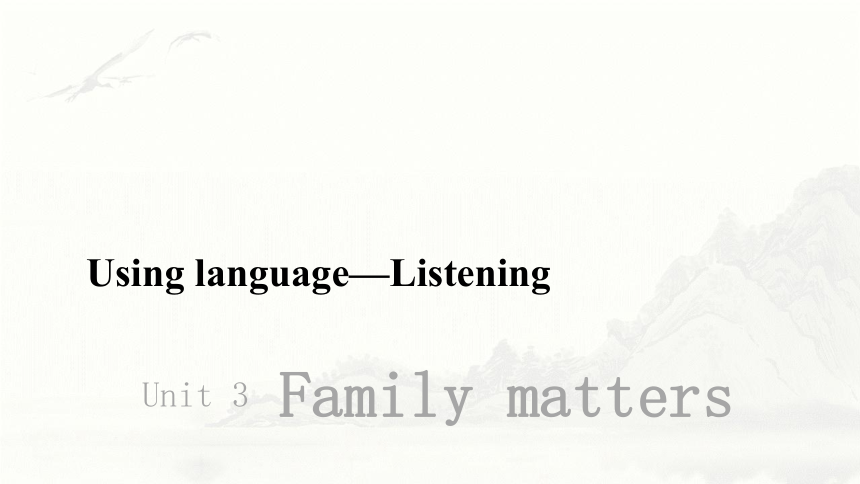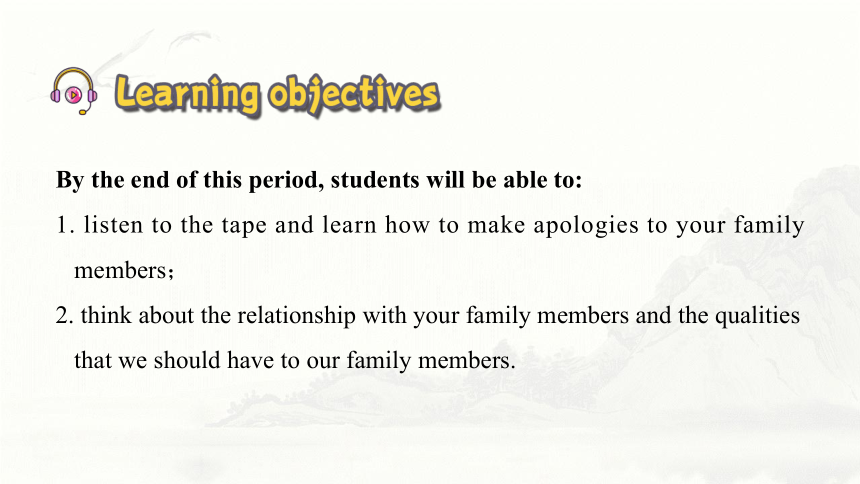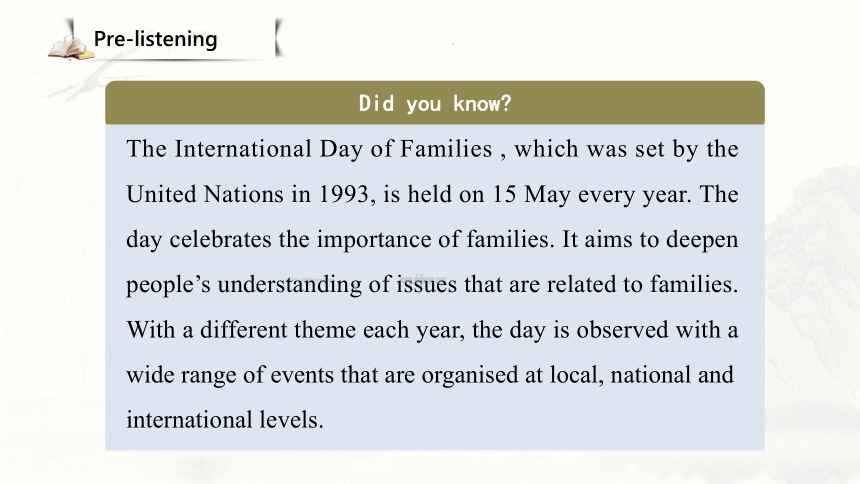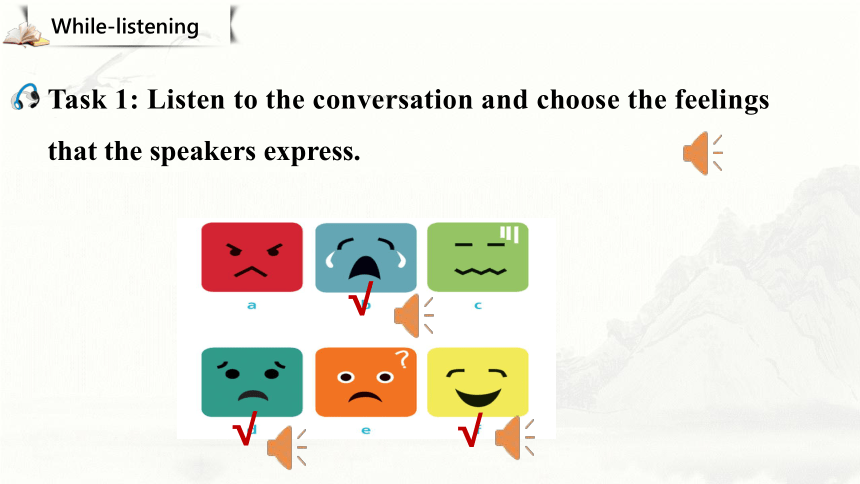外研版(2019 )必修一 Unit 3 Family matters Using language—Listening课件 (共13张PPT,含音频嵌入)
文档属性
| 名称 | 外研版(2019 )必修一 Unit 3 Family matters Using language—Listening课件 (共13张PPT,含音频嵌入) |  | |
| 格式 | pptx | ||
| 文件大小 | 5.3MB | ||
| 资源类型 | 教案 | ||
| 版本资源 | 外研版(2019) | ||
| 科目 | 英语 | ||
| 更新时间 | 2023-10-09 18:00:35 | ||
图片预览






文档简介
(共13张PPT)
Using language—Listening
Family matters
Unit 3
By the end of this period, students will be able to:
1. listen to the tape and learn how to make apologies to your family members;
2. think about the relationship with your family members and the qualities that we should have to our family members.
Did you know
The International Day of Families , which was set by the United Nations in 1993, is held on 15 May every year. The day celebrates the importance of families. It aims to deepen people’s understanding of issues that are related to families. With a different theme each year, the day is observed with a wide range of events that are organised at local, national and international levels.
Pre-listening
Do you have any problems that are related to families How is your feeling
Task 1: Listen to the conversation and choose the feelings that the speakers express.
√
√
√
While-listening
Saturday 22 September
Today, I was in a (an)1.____________, but Mum missed it. Later, on the phone she apologized and explained that she was busy with work because someone was 2.________. I wish she had come.
I know she’s been busy recently, and I understand that. I am just worried about her. I don’t like seeing her so 3._____________.
I think she needs to take some time off work to 4.________.
I told her my worries. To make up for it, next week we plan to go to the 5.__________ together. We’ll go camping and have a 6._______. Most importantly, we’ll have time to talk and 7._______. I am really looking forward to it!
school play
off sick
relax
tired and pale
countryside
picnic
catch up
Task 2: Listen again and complete Alice’s journey entry.
1. say sorry and give the reasons:
2. make a promise and ask for forgiveness:
3. To make up for it:
I am so sorry! I was really busy with work. Someone was off sick, so I had to do his work.
I promise I’ll never do it again! Can you forgive me
I could take a day off and go to the countryside. We can go camping and have a picnic in the hills. And we can really talk and catch up.
Where is the stress
Task 3: Listen again and discuss how Alice’s mother makes an
apology and pay attention to the stress.
Learning to learn
Placing stress on particular words can have a big impact on the meaning and strength of apologies. For example, saying “I am sorry” has more of an impact than “I’m sorry”. Another way of strengthening an apology is by using and stressing adverbs: I’m really sorry, I am so sorry.
Alice: [sadly] Mum, it’s me...
Mum: Alice What’s wrong You sound upset.
Alice: [sadly] I knew it...
Mum: Oh, no! I forgot, didn’ t I Your concert was today, and I missed it!
Alice: It wasn’ t a concert. It was the school play. And yes, you missed it.
Mum: Alice, I’ m so sorry! I was really busy with work. Someone was off sick, so I had to do his work, too.
Alice: Couldn’ t you have asked someone else to do it I know work is very important to you, it’ s just...Everyone said I was really good in the play. I wanted you to see it, too.
Transcript
Mum: I’m sorry I didn’t make it, dear. You worked so hard on your part, and I’m so proud of you. I should have been there. I promise I’ll never do it again! Can you forgive me
Alice: It’s all right. I understand you’re very busy. But you’ve worked so much recently. You need some time off to relax. I don’t like seeing you so tired and pale.
Mum: I know, dear. Perhaps next week I could take a day off, and we could go to the countryside.
Alice: [happily] That sounds wonderful! We can go camping and have a picnic in the hills.
Mum: And we can really talk and catch up!
Alice: I’d love that!
Mum: OK, I’ll talk to my manager about it. Bye for now!
Alice: Bye, Mum! Love you!
Work in pairs. Make up a conversation with the useful expressions in Appendices—Communication bank and act out the conversation to apologise to a family member.
Post-listening
Situation: Your father/mother asked you to use a new app to take photos. You started to help but soon became very impatient. Now you feel sorry about your behavior and try to apologise to and make up for your father/mother.
Useful expressions
Student A Student B
1. I am so sorry. 2. I’m really sorry that... 3.Can you forgive me 4.Please forgive me for... 5.Please don’t be angry with me. 6.I didn’t mean to... 1. It’s ok.
2. It’s all right.
3. I understand that...
4.Let’s forget about it.
5.Don’t worry about it.
Now work with your deskmate to act out the conversation.
Show Time
Using language—Listening
Family matters
Unit 3
By the end of this period, students will be able to:
1. listen to the tape and learn how to make apologies to your family members;
2. think about the relationship with your family members and the qualities that we should have to our family members.
Did you know
The International Day of Families , which was set by the United Nations in 1993, is held on 15 May every year. The day celebrates the importance of families. It aims to deepen people’s understanding of issues that are related to families. With a different theme each year, the day is observed with a wide range of events that are organised at local, national and international levels.
Pre-listening
Do you have any problems that are related to families How is your feeling
Task 1: Listen to the conversation and choose the feelings that the speakers express.
√
√
√
While-listening
Saturday 22 September
Today, I was in a (an)1.____________, but Mum missed it. Later, on the phone she apologized and explained that she was busy with work because someone was 2.________. I wish she had come.
I know she’s been busy recently, and I understand that. I am just worried about her. I don’t like seeing her so 3._____________.
I think she needs to take some time off work to 4.________.
I told her my worries. To make up for it, next week we plan to go to the 5.__________ together. We’ll go camping and have a 6._______. Most importantly, we’ll have time to talk and 7._______. I am really looking forward to it!
school play
off sick
relax
tired and pale
countryside
picnic
catch up
Task 2: Listen again and complete Alice’s journey entry.
1. say sorry and give the reasons:
2. make a promise and ask for forgiveness:
3. To make up for it:
I am so sorry! I was really busy with work. Someone was off sick, so I had to do his work.
I promise I’ll never do it again! Can you forgive me
I could take a day off and go to the countryside. We can go camping and have a picnic in the hills. And we can really talk and catch up.
Where is the stress
Task 3: Listen again and discuss how Alice’s mother makes an
apology and pay attention to the stress.
Learning to learn
Placing stress on particular words can have a big impact on the meaning and strength of apologies. For example, saying “I am sorry” has more of an impact than “I’m sorry”. Another way of strengthening an apology is by using and stressing adverbs: I’m really sorry, I am so sorry.
Alice: [sadly] Mum, it’s me...
Mum: Alice What’s wrong You sound upset.
Alice: [sadly] I knew it...
Mum: Oh, no! I forgot, didn’ t I Your concert was today, and I missed it!
Alice: It wasn’ t a concert. It was the school play. And yes, you missed it.
Mum: Alice, I’ m so sorry! I was really busy with work. Someone was off sick, so I had to do his work, too.
Alice: Couldn’ t you have asked someone else to do it I know work is very important to you, it’ s just...Everyone said I was really good in the play. I wanted you to see it, too.
Transcript
Mum: I’m sorry I didn’t make it, dear. You worked so hard on your part, and I’m so proud of you. I should have been there. I promise I’ll never do it again! Can you forgive me
Alice: It’s all right. I understand you’re very busy. But you’ve worked so much recently. You need some time off to relax. I don’t like seeing you so tired and pale.
Mum: I know, dear. Perhaps next week I could take a day off, and we could go to the countryside.
Alice: [happily] That sounds wonderful! We can go camping and have a picnic in the hills.
Mum: And we can really talk and catch up!
Alice: I’d love that!
Mum: OK, I’ll talk to my manager about it. Bye for now!
Alice: Bye, Mum! Love you!
Work in pairs. Make up a conversation with the useful expressions in Appendices—Communication bank and act out the conversation to apologise to a family member.
Post-listening
Situation: Your father/mother asked you to use a new app to take photos. You started to help but soon became very impatient. Now you feel sorry about your behavior and try to apologise to and make up for your father/mother.
Useful expressions
Student A Student B
1. I am so sorry. 2. I’m really sorry that... 3.Can you forgive me 4.Please forgive me for... 5.Please don’t be angry with me. 6.I didn’t mean to... 1. It’s ok.
2. It’s all right.
3. I understand that...
4.Let’s forget about it.
5.Don’t worry about it.
Now work with your deskmate to act out the conversation.
Show Time
